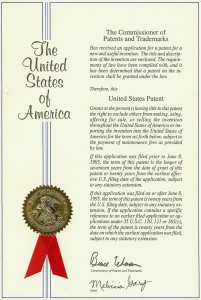What is a Patent?
Patents are documents that protect inventions. Good patents describe the invention in broad terms, making it more difficult to design around the patent or  challenge a claim of infringement. Good patents are hard to draft. If they are drafted too broadly, broadly enough to cover something that has already been invented, the patent is invalid.
challenge a claim of infringement. Good patents are hard to draft. If they are drafted too broadly, broadly enough to cover something that has already been invented, the patent is invalid.
As you might imagine, patents are quite complex.
Patents are so complicated and technical that ordinary attorneys are not even allowed to draft them. Patents are drafted by patent attorneys, who receive special training, have undergraduate studies in a science and pass a special Bar exam to practice before the United States Patent and Trademark Office (USPTO).
Do I Need a Patent?
Well drafted patents grant you a broad monopoly in the marketplace. The downside is they can be expensive, averaging about $9,000 to $10,000 for a simple mechanical device and take a long time, three years or more, to obtain. The question as to whether you should pursue a patent is a business decision. From the Amicus Law Firm in Farmington patent attorney’s perspective, it is always a good idea to pursue a patent. From your perspective, you have you ask yourself some important questions: What kind of annualized profit can I expect with a patent? How many years, if ever, before the patent pays for itself? Are there non-infringing alternatives competing, or likely to compete, in the market-space? Will my product be obsolete before the patent issues? Will less expensive “trade secret” protection suffice?
The Patent Process.
The patent process involves meeting with a patent attorney to discuss costs and timelines. If you decide a patent is something you want to pursue, you may decide to do a patent search. You can conduct a cursory search at Google Patents. Your patent attorney is also available to perform a more comprehensive search. The next step is to draft the patent application. This is the most important part of the process. Here is where you determine the breadth of protection over your invention. It is at this point where a good patent attorney can make or break your patent. Once the application is drafted, your patent attorney files the application with the USPTO. After two years or so, the USPTO “examines” the application, comparing it against patents already in existence. Your patent attorney fights back and forth with the USPTO over the breadth of protection your application is allowed. If your patent attorney is persuasive enough, and your invention novel enough, the USPTO issues your application as a patent.
Finding the Right Patent Attorney.
You do not need the best attorney in the world. You need the best attorney for you. Finding the best attorney for you means looking at factors like cost, skill, experience and communication. As you might imagine, all patents are not created equally. Skilled patent attorneys with a lot of patents under their belts typically obtain better patents than more inexperienced patent attorneys. They also charge more. The best attorney for you however, is not necessarily the most expensive. Ask around. Search the internet for patent attorneys in your area. Go to the USPTO.gov Web site and see how many patents they have drafted. Go visit with the patent attorney. If you like the attorney, confirm that he or she will actually be the one drafting your patent and not passing it off to an inexperienced underling. Ask if the patent attorney has had experience defending patents in court. Success defending patents in court, often translates into drafting better patents. The most important thing is to feel comfortable working with your patent attorney. There are a lot of patent attorneys out there. Keep looking. Pick the one who tells you what you need to know, rather than what you want to hear. You will know it when you hear it.





Recent Comments